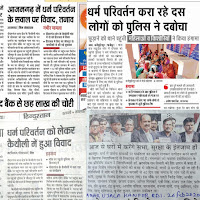I don’t particularly follow the news of religious persecution in India. I am a teacher and not a social activist, nor a human rights crusader. But if you are on social media, you cannot avoid such news for too long. Just yesterday, March 15, 2020, I got to hear about four cases where communal groups assaulted Sunday prayer services—two in Uttar Pradesh and one each in Bihar and Goa. Last Sunday, (March 8, 2020) two other cases of communal assault in UP had come to light. Attacks on Sunday worship, especially, in mofussil towns and villages have become a weekly affair. Every Sunday afternoon you can be almost sure that a WhatsApp message to that effect is coming—and it does come.
A
well-planned campaign is being run to harass Christian prayer groups and small
independent churches across the country. Unfortunately, the communal groups are
manipulating and pressurizing even the local police against the worshippers.
The attacks
are made not by local people. Locals have no problems with prayer meetings in
their neighbourhood. Many of the assailants come from “outside”. This is
something similar to what happens in cases of riots. In recent Delhi riots, it
has been found that most of the goons came from neighbouring Haryana and Uttar
Pradesh. So this allegation that conversions are opposed by local people is
completely false. These attacks are engineered by communal organisations that
often serve the interests of political parties.
The spiritual phenomenon of conversion is ... changed into a religio-cultural battle fought on a political turf.
Attacks on
churches, as we know, are a result of deadly blend of religion and politics. Parties
founded on religious nationalist ideology such as the BJP often attack the
rival political parties for appeasing the minorities and indulging in “vote-bank”
politics. To counter that, these parties have created a fear psychosis in the
Hindu community that it is in danger and the only way to survive is to rally
behind the politicians. The party and its affiliates continue to fan the
communal fire by various means. Recently, an advocate in Delhi, a BJP leader,
filed a public-interest litigation in the Delhi High Court to control religious
conversion. On the grassroots, the party directs its cadres to attack the
churches. This is done to keep the pot of communal polarization boiling.
There is
something deeper at work, too. Religious conversions upset the social
structure, which, in India, is the outcome of the caste system. Numerically
speaking, Indian population is largely composed of people from the so-called
backward classes. Hence, conversion among them is far more visible, even though
people from the upper castes are also converting. The slipping away of the “lower
castes” from their grip is behind the rage of India’s upper castes. The spiritual
phenomenon of conversion is thus changed into a religio-cultural battle fought
on a political turf.
The false
allegation that poor are forced to convert is absurd. As a matter of fact, force
is being used to stop people from exercising their freedom of conscience, their
right to convert. Week after week, force and intimidation is employed to put
fear in people. Week after week, Christian pastors are being harassed and
bullied. Week after week false cases are being filed against innocent people. This
is what we must be challenged by every fair-minded Indian.


2 comments:
Excellent article, very well written, all the links and dynamics involved have been correctly highlighted. We need more people who can understand and respond against such evil designs.
Thank you. The attack on religious freedom is relentless. Our resistance must also be so.
Post a Comment